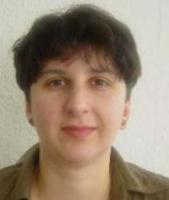Chioncel, Nicoleta | Romania

Dr. Nicoleta Elena Chioncel is an Assistant Professor at the University of Oradea, Romania – Faculty of Educational Sciences, Teacher Training Department and an Associate Researcher in the Adult Education Department at the same university. By teaching “Introduction to Pedagogy” and “Intercultural Education” to students from different fields of study (Engineering, Natural and Human Sciences) she became triggered by patterns female students are developing in their study and later on in their career. She has been involved in a wide variety of projects in teacher training, adult education, educational management and marketing, from data collection and analyses trough project design and student supervision.
She has been a Junior Researcher at the University of Nijmegen, Netherlands (2002-2004) working in the area of adult education in two EU founded research projects: ETGACE “Education and Training for Governance and Active Citizenship in Europe” and Re-ETGACE: “Reviewing Education and Training for Governance and Active Citizenship in Europe - A Central and Eastern European Perspective”. Her work specifically investigated how people learn to be active citizens, which institutions should foster social activism and participation in governance, and what education interventions should be designed to increase social activism. In her research stage, she specifically talked some methodological requirements for qualitative research, more specifically, the validity and reliability of focus groups. At present she is a trainee at the Resource Centre at European Centre for Modern Languages in Graz (July - December 2005).
Degrees: PhD in Science of Education (2004), M.S. in Educational Consulting (1996), B.S. in Pedagogy, all at “Babes-Bolyai” University Cluj Napoca, Romania.
Project at IAS-STS: Women’s Interest and Activism in Science and Engineering vs. Teaching Science and Technology
Recent developments in the European area - related with democratization, citizenship, employment and equal opportunities - made participation and activism an important area of study. Western European countries, as well as the Eastern post-socialist nations are complaining of a low representation of women in some areas like science, engineering and politics.
The existing sectoral segregation and gender unbalance will be investigated comparatively in Austria and Romania, at the university level as well as in the workplace. As a starting point we will tackle the theoretical distinction between being people-focussed (teaching professions for example) and machine-focused (engineering or technology). This could be regarded as a form of psychological and sociological distinction between feminine expressiveness and masculine instrumentalism. One important question of the present research is how can one differentiate between two perspectives when approaching the stage of choosing an educational path or later on, opting for a specific workplace? Another question, with significant policy implications, rises, therefore: how to increase women’ interest and activism in applied science and engineering or even teaching science and technology or research?
The specific goals of this project are:
- Measuring and explaining the differences in motivation for a different study path and career of women in science and engineering /technology: applied and teaching oriented jobs.
- Comparing the patterns for under representation of women in science and engineering training: discussing intercultural differences.
- Investigating some successful case studies of women in science and technology in the two countries, as well as examples of women choosing professional re-conversion.
- Developing a practical model for attracting women in these professions and developing their activism during their study period and at the workplace.
- Proposing educational strategies (formal, non-formal and informal) for enforcing and empowering women being trained or working in science and engineering.
Selected publications
Jansen, T., Chioncel, N.E., Dekkers, H. (2005) Education for social integration and cohesion: learning active citizenship, submitted for review to British Journal of Sociology of Education.
Chioncel, N.E. and Jansen T. (2004) (Eds.) Reviewing Education and Training for Governance and Active Citizenship in Europe - A Central and Eastern European Perspective. The Implications of the Research for Central and Eastern European Policy Design on Active Citizenship and Governance, Research Report, European Commission Brussels, (Nijmegen: University of Nijmegen).
Chioncel, N.E., Veen, van der R.G.W., Wildemeersch, D. and Jarvis, P. (2003) The validity and reliability of focus groups as a research method in adult education, International Journal of Lifelong Education, 22, 5, 495-517.
Chioncel, N.E. and Hatos, A. (2002) Transition and Community Development, paper presented at EURESCO Conference "Loss of the Social Bond?", Sheffeld in Tirol: Austria.
Chioncel, N.E. and Hatos, A. (2002) The Construction of Active Citizenship in Romania, paper presented at ETGACE International Conference, Brussels: Belgium.
